Click images to enlarge
I never thought live analysis of films would be so difficult yet easy at the same time. No better way to start a critical reflection than with a contradictory statement. Let me explain, for me to observe an incident in the film and further explore it, that’s what I find easy. The difficult part is trying to pull myself back out of that thought and pick up where I left off, and I’ve never been a great multitasker.
2001: A Space Odyssey (1968)

This was probably one of my favourite connections that I (and many others) made during the screening. HALs vernacular and ‘everywhere’ presence effectively instilled the fear of AI that Kubrick wanted to achieve, and demonstrating the true value that Kubrick’s work has in influence of pop culture.


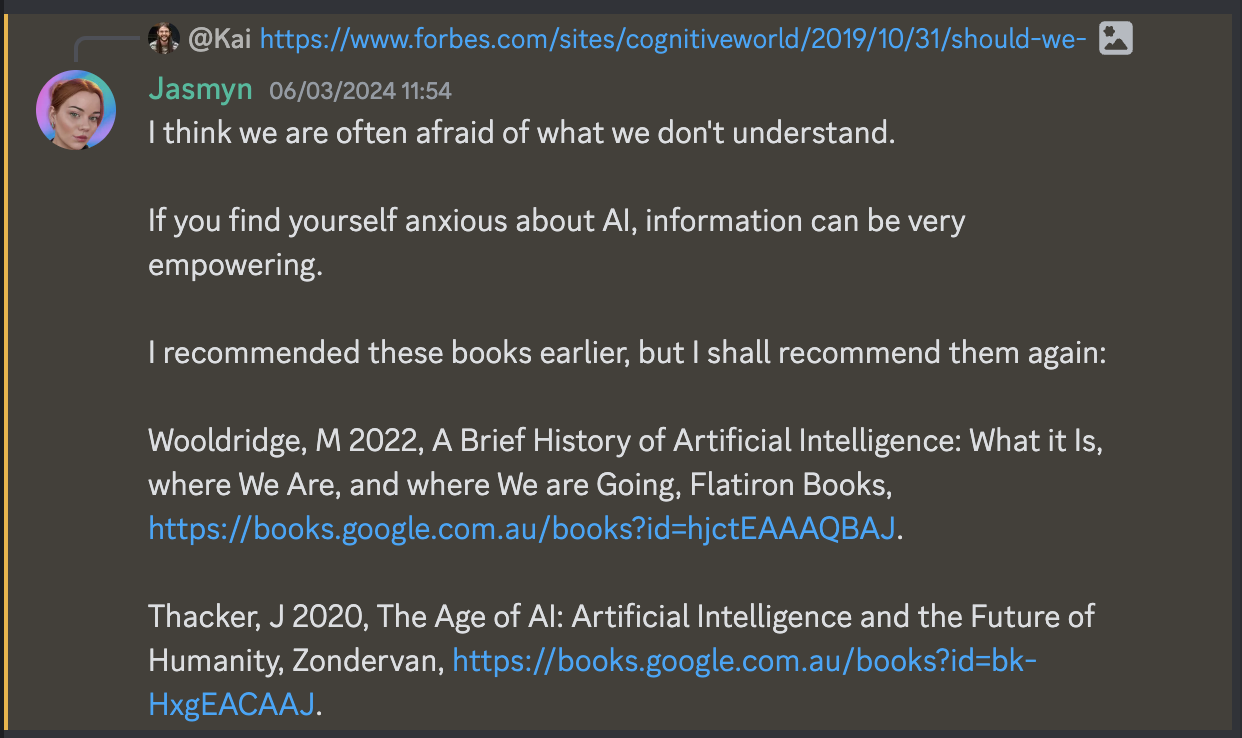

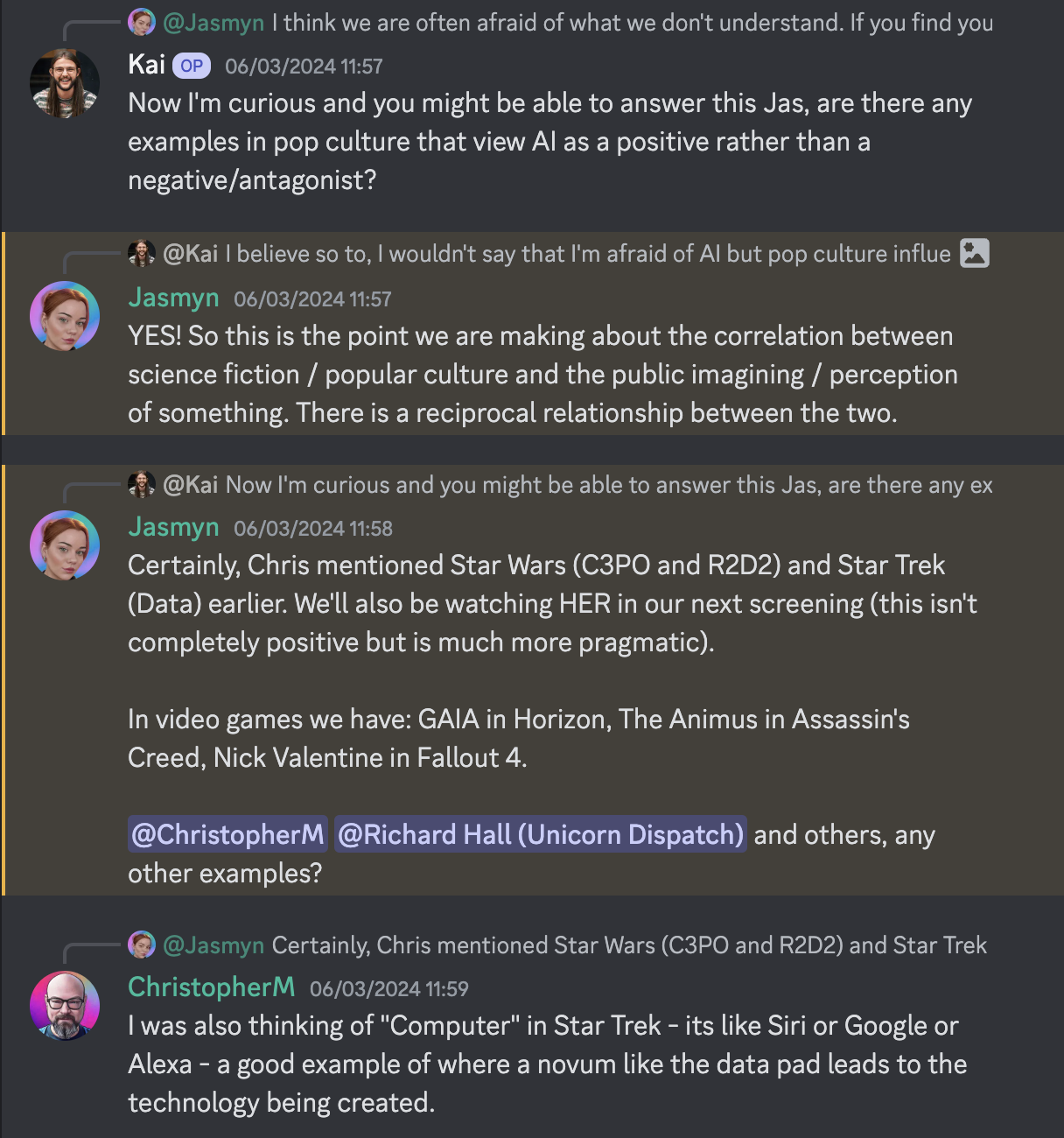
The novum of HAL was the pinnacle of darkness in this film and that was well known to many of us observing the film, sparking valuable conversation between myself, Jasmyn, and Chris.


Here Coby, James and I discussed the reality of today compared to Kubrick’s envisioned future. In retrospect, it boils down to the point that Sci-Fi is always judged against present conditions. Much of the films vision was correct, variations of today’s Facetime, iPad etc. How we were observing was through a retro-futurism frame, with the stylisation of mannerisms, clothing, furniture being very so clearly from the 1960s. In our current timeline, our version of retro-futurism, would be the 1960s version of futurism.
Her (2013)

One point I made in conversation in Chris touches on the complexity of human emotions. Samantha, Ted’s AI model, replicating or realistically ‘feeling’ emotions was quite the talk of the Discord. My take on it came down to the above, although it’s easy for us to identify and categories others’ emotions, that doesn’t mean we’re right. I’d argue it’s almost impossible to truly know what another person is feeling and experiencing, as we can never truly measure how one person is feeling (Mauss & Robinson 2009). When Ted is interacting with Samantha as she appears emotional, it’s reasonable for him to be upset and bewildered, for a non-human entity to attempt to understand and convey something so complex, that we see fit that only living entities experience.

After the screening, I allowed myself some time to circle back to the forum to pull some more sources and dive a bit deeper into my thinking. Whilst also linking into the complexities of emotions as previously discussed, I looked at Samantha’s ability to mimic embodied consciousness and how that effects Ted (Murphy 2017).
Ghost in the Shell (1995)

In retrospect of this point, I would change “over-complication” to over-compensation due to the human experience being inherently complicated. It provokes the thought of how many technological enhancements can one receive until they go from feeling alive to floating through space and time. Technological cybernetic systems waging war against the organic human mind, another cybernetic system, although correcting themselves in a unified form, can leave the mind drifting from reality of what existence means to the individual.


I needed to include this one to explain my typical pattern of thinking. I will say something witty (hilarious but I’m humble), then a stroke of genius will occur. This is how a lot of my analysis has come about these last few weeks, and I’m not against it, whatever works, works.

The acknowledgement of filtering our experiences through the lens of social media is so important, because it’s an early start to becoming comfortable with the idea that more and more aspects of our lives can be augmented and remixed.
In summary, as the weeks went on, I found my ability to live analyse these texts become easier and easier, although I still have a way to go. In future I may opt to watch the texts ahead of time to garner some early points and resources, this will also help me to gather sources early, this I struggled with during the screenings. I also think I need to be a bit more careful with the language I use when conducting an analysis, as it can sometimes draw away from the point I’m trying to prove. I would like to improve my skills of being able to focus on the text and analyse at the same time but I’m not yet sure how exactly I can hone that in to improve.
Cover image created by Midjourney using prompt: a mashup of the movies 2001 a space odyssey, her and ghost in the shell –ar 16:9
Discord conversations (more in thread links)
Links to Discord threads:
2001: A Space Odyssey: https://discord.com/channels/1179652660769607730/1214710361547350106
Her: https://discord.com/channels/1179652660769607730/1219783171848011826
Ghost in the Shell: https://discord.com/channels/1179652660769607730/1224854603926081597
References
Mauss, IB & Robinson, MD 2009, “Measures of emotion: A review,” Cognition and emotion, vol. 23, no. 2, pp. 209–237.
Murphy, P 2017, ‘“You Feel Real to Me, Samantha”: The Matter of Technology in Spike Jonze’s Her’, Technoculture, vol. 7, viewed 25th March 2024, https://tcjournal.org/vol7/murphy/.
Williams, J 2023, ‘Stanley Kubrick’s astute prediction regarding the future of AI’, Far Out Magazine, 17th June, viewed 25th March 2024, https://faroutmagazine.co.uk/stanley-kubricks-astute-prediction-regarding-the-future-of-ai/.
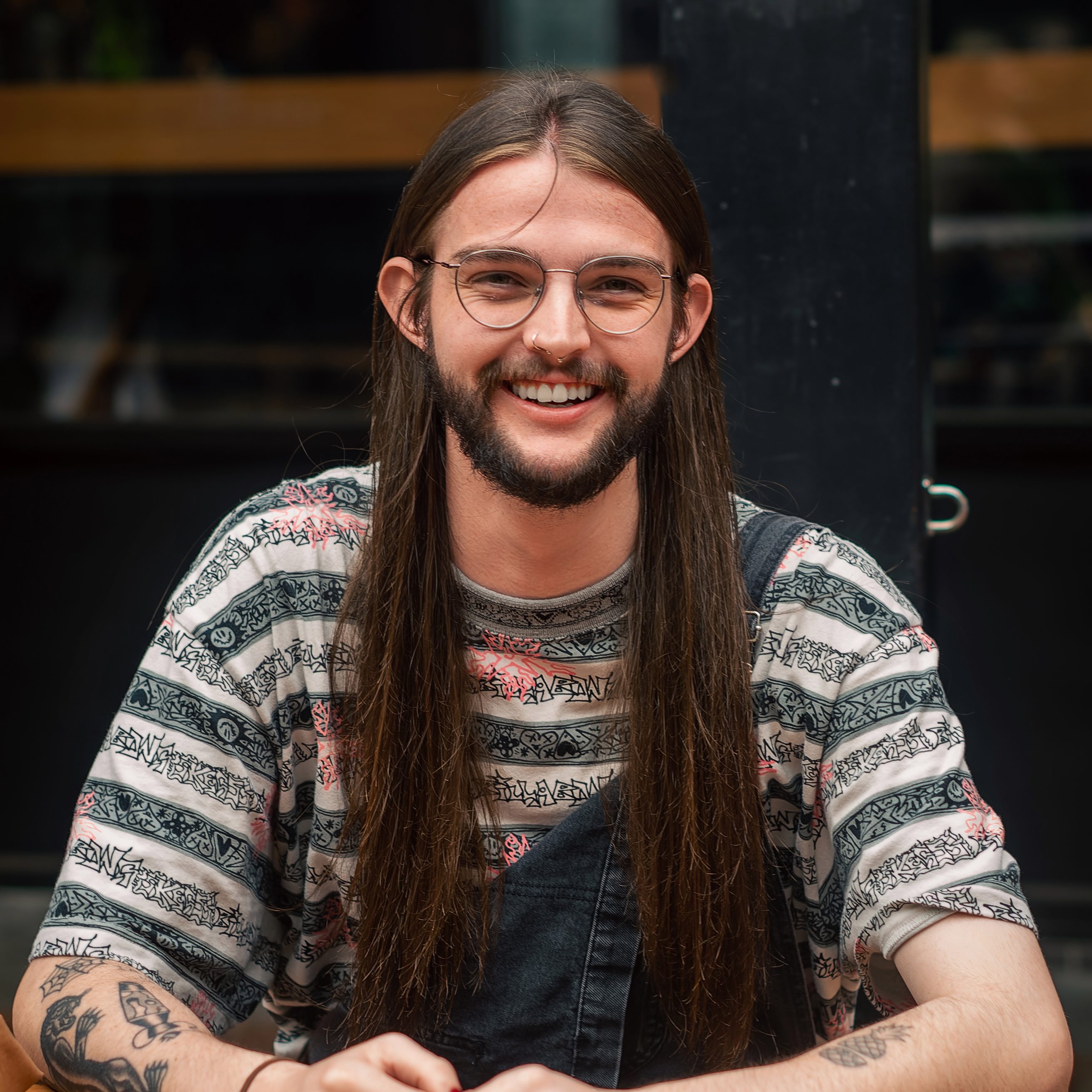


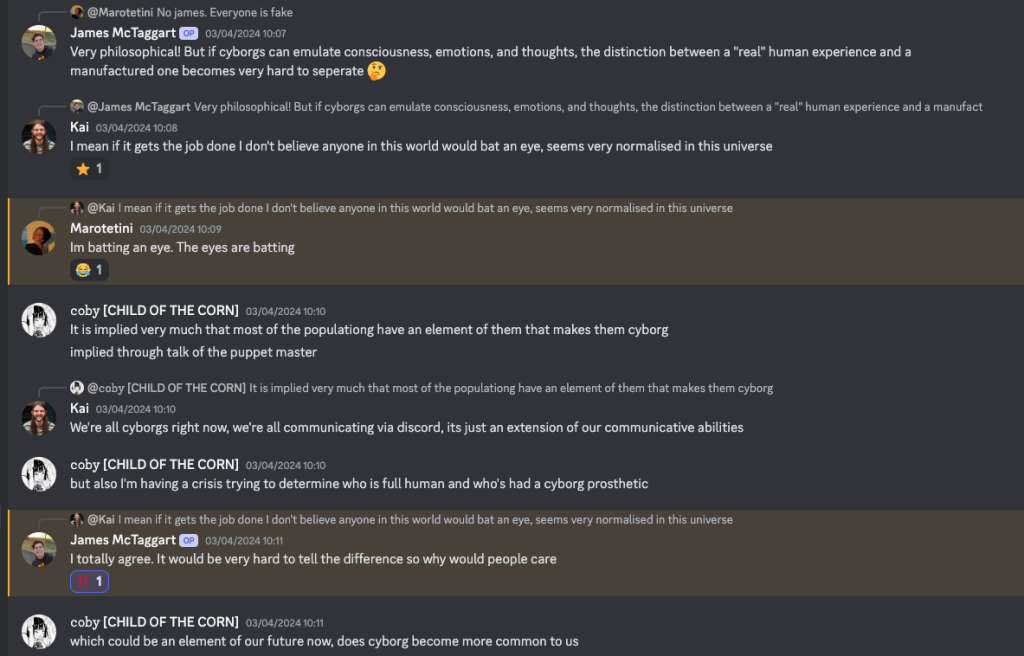

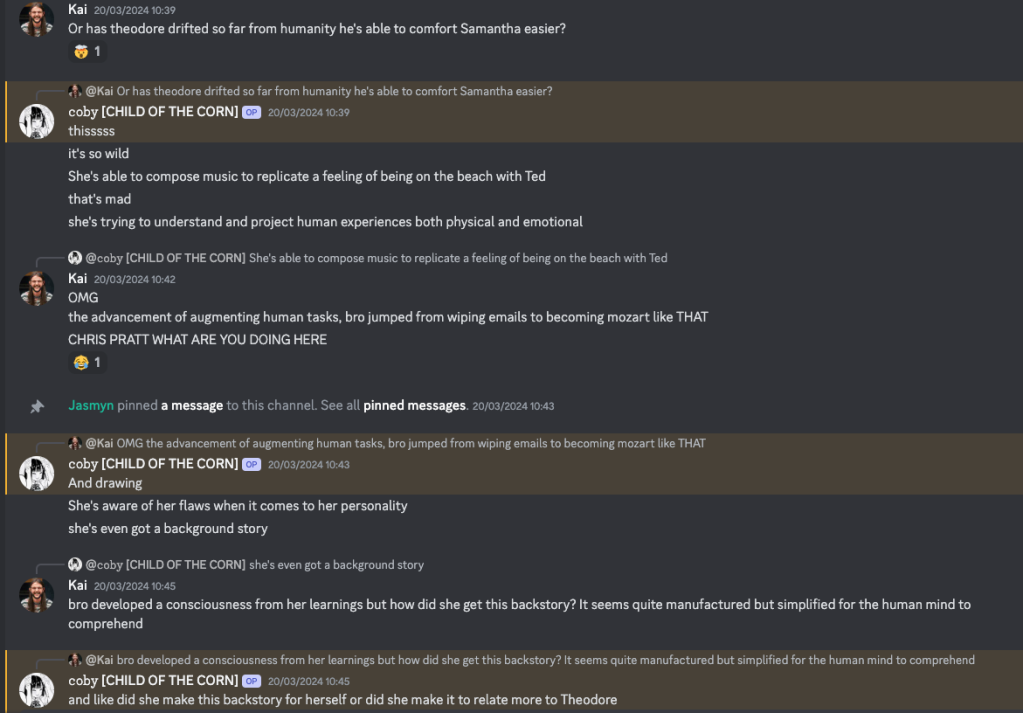

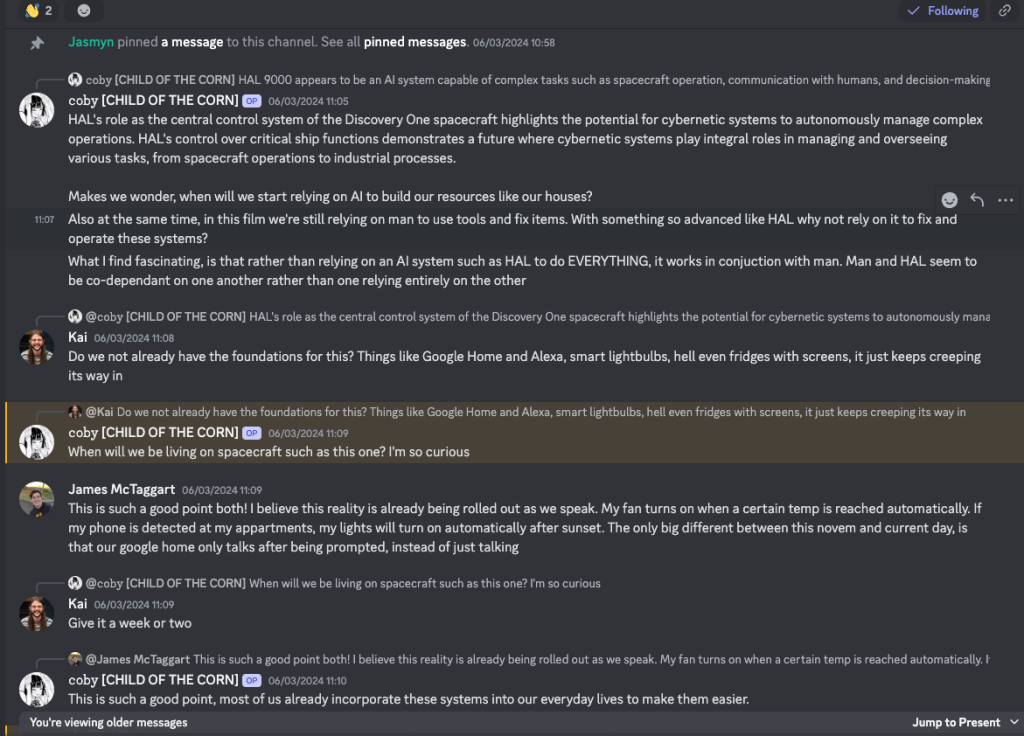

Leave a comment